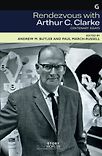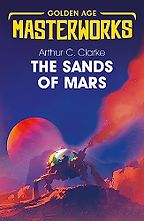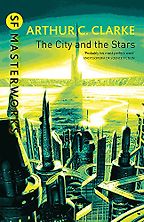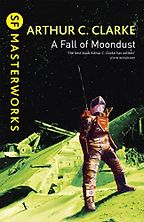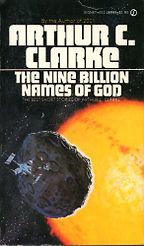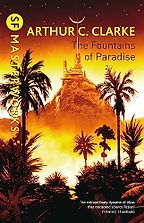Arthur C. Clarke has been extraordinarily influential in sci-fi, and indeed in science – we now have the Arthur C. Clarke award for sci-fi, the Sir Arthur C. Clarke award for space exploration, and the Arthur C. Clarke Foundation for Science Education. Could you tell us a little about his influence?
He’s probably the most influential science fiction writer since H. G. Wells – and they had a similarly strange experience. Wells started off as a working class guy, born in Bromley in Kent. He went on to do a science degree with Huxley – and is opened up to conversations with world statesmen. Clarke did something very similar. He was born in Somerset, in December 1917, and grew up on a farm with his parents. They’re lower middle class, upper working class. He got into the whole enthusiasm about radio and telegraphy and new communication and served in the RAF during the Second World War as a communications network officer. Then, after the war, because he’s been in the service, he gains the right to study a degree – in his case at King’s College, London, where he studied physics and mathematics, and gained first class honours.
He had already been writing science fiction at this stage. He was one of the first attendees at the Leeds science fiction convention in 1937, which was the coming-out party for British science fiction fans in its very early days.
By the time we get to the 1960s and the books we’re talking about today, he is a go-to person to talk about the space race. He’s talking about the launch of Telstar, and the moon landings; he is somebody who has contacts with – like Wells – world statesmen. He has gained an astonishing position in global culture. I mean, I grew up seeing Clarke as a TV personality in the late 1970s, early ’80s. So he’s an astonishingly influential guy, who comes from relatively meagre beginnings. And I think ‘work’ is a theme that will come up a lot in our discussion today.
The difference with Wells, though – Wells, shall we say, dallied with the ladies. That was his private life. But Clarke was a gay man, at a time when homosexuality was outlawed in Britain. It may be part of why he moved to Sri Lanka – the less repressive culture. He kept that sexuality pretty much hidden throughout his life, even after homosexuality had been decriminalised from 1967 onwards. So his private life was quite shadowy, away from the public persona.
Before we launch into your choices today, is it worth discussing what you’ve not chosen?
Yes! I’ve quite deliberately left out three books: Childhood’s End, Rendezvous with Rama, and 2001: A Space Odyssey – for which he wrote the screenplay with Stanley Kubrick, and won the Oscar. They’re the three books that tend to dominate the academic scholarship on Clarke’s writing, and they tend to skew our view of Clarke. So I’ve quite deliberately chosen five other books, just to give a slightly more rounded picture of Clarke’s writing.
Let’s start with the title that established Clarke’s reputation: The Sands of Mars (1951). Could you introduce us?
The Sands of Mars is Clarke’s first major novel – there’s Prelude to Space, but this is really his first. He had been writing science fiction stories since the end of the 1930s, so he was already well-established. In terms of the science fiction magazines, he was writing for New Worlds here in Britain; he was writing for the pulps, Astounding in particular; and for Startling Stories, and other magazines like that. So he was a well-known short story writer – but this is the novel that establishes the early perception of Clarke.
The Sands of Mars is what Gary Westfahl calls a ‘cosmic engineer story’. We have a fledgling colony on Mars, established at some point towards the end of the 20th century. It’s primarily a scientific establishment, and they are slowly trying to make the place more habitable. Typically of Clarke, politically, we have a benevolent world state on Earth – again, echoes of Wells there.
But the key thing is, scientists on Mars are carrying out covert projects in order to terraform the planet over a lengthy period of time. They’re doing two things. One is they’re growing vegetation plants, which will generate oxygen. Then the big secret is that they’re going to try and turn the moon of Phobos into an artificial sun. And they’re keeping this secret from the world state. So we’ve got an interesting thing here about Clarke: on the one hand, yes, there’s a benevolent world state – democratic institutions, yada, yada, yada. But at the same time, if you really want progress, then you have to have a kind of covert scientific elite doing it for themselves. There’s always this mistrust of governance – and a belief in the scientist, the ‘cosmic engineer’ to use Westfahl’s phrase, who is going to do something covertly but with good intentions. This is very much a non-Frankenstein view of science – the scientist is a benevolent figure.
So it’s a terraforming story. The chief character is Martin Gibson, who is – surprise, surprise! – a science fiction writer, in an almost meta-fictional gesture. So we see the terraforming of Mars through the eyes of Gibson, a non-scientist, who can act as our witness, and our guide as well. I think that’s an interesting device. Clarke’s saying, yes, it’s the people who read science fiction who are on the right wavelength – we’re the guys who know what’s really around the corner, we know the true story of destiny and scientific progress. He’s bigging up the science fiction community. So Clarke not only offers a very optimistic vision of the future (albeit one that has to avoid politicians); at the same time he’s also ingratiating himself to the science fiction community. It’s a variation of the “fans are Slans” motto from Van Vogt’s novel about a superhuman, Slan. It gets your potential readership on side from the get-go.
Is Clarke’s scientific optimism typical of the period – with the space race and so on?
Yes, definitely, that’s key. It’s 1951 – so it’s around the same time The Eagle comic was being published, with Dan Dare, ‘pilot of the future.’ Clarke was a scientific adviser to The Eagle – he really got himself into all the tributaries of SF production and fandom. We’ve also got Charles Chilton’s Journey into Space on the Home Service; that’s about to start broadcasting. We’re a couple of years before The Quatermass Experiment on TV… So he’s very much part of that whole culture.
He’s also one of the New Worlds writers. A group of writers met at the White Horse pub in New Fetter Lane: John Wyndham, John Christopher, E. C. Tubb, Ted Carnell and so on. There’s a coterie of writers who, in many respects, see themselves as preparing the future. There’s a very nice anecdote by Doris Lessing in her autobiography, where she met the White Horse writers. She thought they were these dull grey men, and then she realises – no, there was a highly sophisticated conversation that was happening in this pub in London!
Your next choice is the novel Clarke was most invested in: could you tell us about The City and The Stars?
This is the absolutely key text, the one where Clarke most describes his beliefs about the future and about society. It’s utopian fiction, and for Clarke this is the book he’s most emotionally invested in. He starts writing this in 1935, when he’s about 17. His 1948 novella Against the Fall of Night is an early version of this novel. He then takes another eight years and finally produces the full-length novel in 1956. So he’s basically working on this book for about 21 years – at which point he’s still a relatively young guy, of course, at 38.
It’s a deep, far future novel – something like Jack Vance’s The Dying Earth from 1950. We have a highly technological automated society, Diaspar, which is run by a central computer – a benevolent, benign central computer. This is 1956, and the technology of cybernetics has begun to percolate, with the early works of Norbert Wiener and people like that.
It’s the last refuge of humanity. There are no new children, but the inhabitants of Diaspar lead a prolonged existence. When they die, they get fed back into this bio-bank, from which the next generation will emerge – but it’s the next generation of themselves. Nobody new is born ever in Diaspar. Except that we have ‘the one’: we have a hero, Alvin, who we discover has never lived before. And of course, we know in these narratives, he’s going to have a destiny.
He is an interesting character, Alvin. He’s bored and fed up in his utterly perfect society where nobody has to work. Again, work is important: in The Sands of Mars they work terraforming the planet; here, nobody works. They are hedonistic lotus eaters, they play virtual reality games, and nobody does anything. Alvin is yearning for quests and adventure. He allegedly has a romantic liaison, but doesn’t seem very much interested in the girls, which is interesting.
To cut a long story short, he discovers another city – Lys – or, rather, not a city, it’s agricultural. Another utopia, where technology doesn’t exist. They do procreate, they do have children. I can’t give more spoilers away to you, but he discovers that all of this is part of a much, much larger cosmic narrative, and ultimately about humanity’s place in the universe. On the one hand, we have this idea that humanity does have a role to play in the universe; but we also find that it’s marginal, that we’re a much, much smaller thread in the whole tapestry of this cosmic history. And that I think tells us a lot about Clarke. Yes, he wants to have this expansive view of the cosmos; but his view of humanity is, yeah, we’ve got a part to play, but it’s actually really small. There’s a kind of humility about Clarke – his nickname was ‘Ego’, but when you look at his writing, there’s often this lack of ego. We’re important, but we’re not that important.
There’s another way to look at The City and The Stars – it’s the mid-50s, the period of decolonization. With Diaspar, there was an imperial history behind the city, and it’s all faded away. Not unlike Britain, of course, at this time. So this is saying – we’re going to find a new place in the universe, but it’s going to be smaller than it was before. But that’s good, too – because it means we are knotted into this whole great, larger thread of history.
You raise this last argument in your own essay in Rendezvous, your collection edited with Andrew M. Butler – could you tell us a little about the aim of this collection? I know Clarke was somewhat dismissed critically by ‘New Wave’ sci-fi…
It’s interesting, on the new wave thing – bear in mind that when Clarke won the Nebula Award for Rendezvous with Rama, he actually beat Thomas Pynchon’s Gravity’s Rainbow. An interesting moment, which Jonathan Lethem has written about in his contentious essay, ‘The Squandered Promise of Science Fiction’.
We wanted to go back into the mysteries of Clarke with this book. He isn’t as straightforward a figure as you might think he is. And even though he’s one of those default voices in genre science fiction, he isn’t written about as much as you would have thought. So we wanted to go back to the writing and see it perhaps slightly differently – uncover aspects of the writing that haven’t been explored before. A ‘rendezvous’ is about meeting with an assignation in mind – but we don’t really know what Clarke’s assignation was, because he was this enigmatic figure. So this is all about trying to find some hidden assignations in Clarke’s work.
In Clarke’s novel Rendezvous with Rama, there’s this weird object that moves into our solar system, and nobody knows what it is: it’s the classic Big Dumb Object in science fiction. The progress of this craft causes huge panics and financial crises on planet Earth. And we have our plucky group of engineers, scientist types again, who are going to find out what it is. And then Rama, as it’s called, just wanders out of the system and goes back into bleak space! And that’s the interesting thing about it – on the one hand it’s another cosmic engineer story, about how we explore this thing, and what we find out. But it’s also about what we don’t find out – and there’s really not much plot. This thing comes in, and it disappears again, and we know very little about it. It’s almost similar to New Wave science fiction, because it’s shrouded by everything that we don’t know.
When we think about the kind of experiment with science fiction that occurs in New Worlds under Michael Moorcock’s editorship, we think of something radically plotless, like Ballard’s Atrocity Exhibition; but actually Rendezvous with Rama is very plotless, and chimes with that later New Wave moment. Clarke may want to trust the science, but he is aware that science doesn’t know everything, and that things are inexplicable.
Let’s talk next about A Fall of Moondust, which is perhaps more classic hard sci-fi…
So this was one of Clarke’s most acclaimed novels, in 1961, nominated for both the Hugo and Nebula Awards. It’s a classic ‘How do we get out of this disaster?’ scenario. Unlike Mars in The Sands of Mars, which is in the process of being colonised, here the moon has been colonised – and now we have space tourism. It’s interesting with everything going on at the moment, with Musk and Bezos… Clarke imagines here, once we colonise, we’ll turn it into a commercial enterprise. And I think he’s actually quite sceptical about that.
Clarke imagines – and this was well in keeping with scientific speculation of the time, although whether or not it’s true now is another matter – but he imagines a basin on the moon, covered with a kind of dust, which we can glide across with a sort of cruiser. And we can have tourists, and they can take pictures and say, ‘I’ve been on the moon, and I came back with this awful t-shirt,’ that kind of thing.
But then what happens if there’s – not an earthquake, but a moon quake? What if there’s a landslide, and the dust isn’t stable, and the cruiser falls into a massive trench in the moon’s surface? How are we going to get these guys out? There are various attempts to get them out, and so on. Westfahl sees this very much as another cosmic engineer novel – how does the scientist, Robert Lawrence in this case, get these guys out in the nick of time before they die?
It’s a bit more complicated than that, actually. Clarke pays a lot of attention to the crew – Pat Harris and Sue Wilkins – the people who aren’t scientists, the guys in the commercial enterprise. Who’s going to ship these passengers around, who’s doing that? So this is space exploration as a nine-to-five job. They’re not running the enterprise: they’re the labourers, the workers. Very similar to E. C. Tubb, a much-maligned figure in British science fiction – and John Christopher’s great short story ‘Christmas Roses’ is another example. I think there was definitely a class element coming in here. Clarke comes from this lower middle class, upper working class farming community – he’s not somebody who is born into wealth or privilege, he’s worked very hard to get where he has. He absolutely sides with the working characters – even if they’re not working class, they’re labouring people.
But conversely, he’s very sceptical about the idea of space tourism. The tourists are treating the moon as if it’s a pleasure garden – as if it’s just a place you go to, you take pictures, and you come back with your rubbish t shirt. And it’s like – hold on a minute, this is the moon! We’ve got this extra-terrestrial object, we’ve landed here, we’ve colonised, we’ve done all this amazing stuff! And they just treat it like a holiday. It’s a critique about seeking leisure for its own sake. It’s an interesting tension about ideas of work, which isn’t just simply about engineering.
It’s no surprise that by the end of the book, one of the characters is planning their next journey to Mars: we’ve done the moon, now Mars; and then from Mars, we’ll think about Jupiter, or Saturn, and so on. So that’s the proper job. That’s the proper work to be done.
So I think, actually, it’s a more interesting book than just, “How do we get these guys out of the problem?”.
Your last two choices focus more on Clarke’s philosophical views, and the slightly vexed question of his religious views. Could you introduce the titular story of the short story collection The Nine Billion Names of God?
This is a 1967 selection that Clarke himself put together; so these are his own personal favourites. As I said, he was initially a magazine writer, and produced a whole series of short stories. A number of short stories lead on into the novels: ‘Guardian Angel’ becomes Childhood’s End, for example. And in The Nine Billion Names of God, we have ‘The Sentinel,’ which would be one of the stories that feed into 2001: A Space Odyssey. But ‘The Nine Billion Names of God’ is a delightful story itself.
We have a group of Tibetan monks – Clarke is suspicious of most religions, he claimed to be an atheist, but he definitely had a soft spot for Buddhism, as Jim Clarke has written about. The monks have for centuries been writing out all the names of God, compiling them – the project is to know God, and if you can compile all of them, you will have absolute knowledge. And then they realise, crikey! this is going to take us about another 15,000 years, just writing all the names. So let’s get this newfangled thing – because this is a story from 1953 – called a computer. They get an early IBM computer basically – this is when IBM was beginning to sell their computers into workplaces. So it speeds up the whole process: fantastic. We now know the true name of God and all the different permutations and variations that the computer algorithmically put together.
At which point we have this marvellous line… It’s interesting, the story is not told by one of the Tibetan monks, but by an outside viewpoint character. As he walks away from the monastery, he looks up at the night sky. And, to paraphrase, the stars are quietly going out. (Which of course is scientifically impossible. The distance of light from the stars to Earth, you know, they wouldn’t just automatically just go out. But hey, Doctor Who has done that more recently.)
So once we know God, the universe ends. You can see how that leads into things like Douglas Adams in The Hitchhiker’s Guide to the Galaxy – there’s this whole joke that if we ever do find out the true meaning of the universe, maybe the universe would just disappear. And maybe that’s already happened, and we’ve got an even more crazy version in its place.
The ending is a classic short story technique. It uses a twist device, as we see so often in classic British short fiction, late Victorian or Edwardian. But it’s also something else… It reminds me of the ending to a story by Jack London, ‘To Build a Fire’ – which is not a science fiction story at all. But in ‘To Build a Fire,’ there’s an amazing shift from the mundane to the cosmological, and then back again. Similarly here: we go from the guy saying goodbye to the monks and walking out of the monastery – then he looks up, and all the stars are going out. It’s a shift from an insignificant character to a sense of the cosmological, and it’s so lovingly and neatly done. And I think that’s an absolute quintessence of Clarke’s writing: the way that he balances between mundane characters, workaday characters, and then that sense of the cosmological, the metaphysical. He’s not a religious writer – he claimed to have no religious belief – but he does have a sense of the spiritual and the numinous.
Another interesting story in the collection is ‘The Star.’ It’s told from the point of view of a Jesuit priest, who acts as a kind of ship’s chaplain. They discover evidence of the Star of Bethlehem – but in the story, we discover that the star was actually a supernova, and it would have destroyed an entire civilisation. And the priest is then hit with this crisis of faith: how could a loving God wipe out an entire civilisation in a planetary system light years away, in order to hail the birth of his son?
The Jesuit priest is an utterly sincere man, who’s treated with absolute faithfulness by Clarke – he’s not in any shape or form pejorative or condemning of this character. But then he poses an existential drama that calls the character’s belief into crisis. And again we have that lovely turn: a wonderful effect where Clarke turns on a sixpence, and shifts the perspective around. Again, it has echoes of Wells.
I think it’s a lovely, lovely collection, which really shows Clarke’s dexterity as a writer.
I was very struck by a quote from Clarke given by Jim Clarke in Rendezvous: “Many of the questions we ask of the universe may turn out to be completely meaningless.” What a remarkable thing for a sci-fi writer to say!
It goes back to the word I used earlier, which is humility. His nickname was Ego, and there may have been his personal ego, you know, having to show off his knowledge. But in his writing and his craft, he’s very humble and open minded. He isn’t a Richard Dawkins character. He’s really happy to sit with a whole number of different belief systems, from the scientific to the spiritual. He’ll make it known that personally, he doesn’t believe – but his writing tells a different story. And I think that’s actually really interesting.
And it’s important for your last choice, and Clarke’s last major novel: The Fountains of Paradise. Could you introduce us?
Yeah, this is a really interesting one. I think in his later novels – like Imperial Earth, which Mike Stack writes brilliantly about in Rendezvous – Clarke does feel a greater amount of licence, and becomes a bit more playful in his writing.
In The Fountains of Paradise we have the story of Vannevar Morgan, who is – again – the engineer figure. He’s hoping to build a tower that will link to a geostationary satellite for space travel – we’ll be able to zoom people up to the satellite in this kind of space elevator.
I think it’s very literary, without being self-consciously literary. I tend to think of a play by Ibsen, The Master Builder: the story of a great architect who, in his later days, looks back on his life and discovers disillusionment. Whereas in Clarke’s story, we have a story about somebody who leaves a legacy – there’s almost a revising of Ibsen going on there. That’s totally speculative, but it feels like it to me.
Morgan wants to build this space elevator in a country that is almost certainly Sri Lanka, though it’s not called Sri Lanka in the novel. But no, he can’t build there because it’s a sacred area. We have, again, a Buddhist monk. He objects – and Morgan respects that, interestingly. He does get to build a space elevator on Mars instead, a smaller one, with the same sort of effect.
Around the story, though – and this is interesting, even though it’s not revolutionary – there are two framing stories. Clarke is interested in how we frame stories – again, from late Victorian or Edwardian short story practice. He’s not as crafty as, say, Kipling; but there’s still something going on there.
There’s a frame narrative involving an ancient king, King Kalidasa – it’s based on a true historical figure, and his ambitions to build a pleasure garden. So we have a mirroring: the building of the space elevator and the building of the pleasure garden. And then we jump forward at the end of the story to another frame narrative, which is about the post-apocalyptic Earth. It’s become an icy wasteland – it’s the 1970s, so there are these ideas are about the next Ice Age. Clarke was very much wrapped up in ecological concerns, and that comes through in this last third of the novel. Aliens come to visit this now-barren wasteland, and of course, they discover the legacies of Vannevar Morgan: six space elevators. There’s an echo of Shelley’s poem ‘Ozymandias,’ where the poem ends with a ruined statue and says:
Look upon my Works, ye Mighty, and despair!
– and there’s just rubble and wreckage.
In Clarke’s version, the pleasure garden doesn’t survive, but the space elevators do – they may not be working, but they survive as mysterious artefacts. The aliens have to speculate upon the meaning of these structures.
Clarke isn’t doing anything radically revolutionary here as a writer. But he comes up with a really interesting series of perspectives and comparisons and contrasts in the course of this narrative. I think it’s very well worth reading that novel.
Interview by Sylvia Bishop
January 26, 2024. Updated: April 29, 2025
Five Books aims to keep its book recommendations and interviews up to date. If you are the interviewee and would like to update your choice of books (or even just what you say about them) please email us at [email protected]
Five Books interviews are expensive to produce. If you've enjoyed this interview, please support us by donating a small amount.

